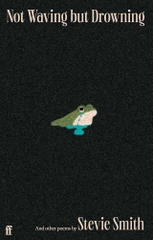'Cheerful, brutal, beautiful! Stevie Smith is the wildest poet of them all.' Nick Cave
'I better say straight out that I am an addict of your poetry, a desperate Smith addict.'
Sylvia Plath, writing to Stevie Smith, 1962
'Revolutionary, wild, and fierce.' Ali Smith
Stevie Smith was not only a famous poet in her lifetime but a poet before her time, a radical eccentric who relished the performance of poetry as sung and spoken word. The poems are distinctly unsentimental as she casts the 'eye of an anarchist' over propriety and convention, finding comedy in the tragic and tragedy in the comic. She asks the questions we don't have the nous or courage to ask, speaking for the lonely, the troubled and the trapped, and for any of us who at one time or another have found ourselves not waving but drowning.




'I better say straight out that I am an addict of your poetry, a desperate Smith addict.'
― Sylvia Plath, writing to Stevie Smith, 1963
'Revolutionary, wild, and fierce.' -- Ali Smith
'Slim and stylish [.] A neat and nifty edition, easy to carry around and fitting the rhythms of commute [.] A nicely affordable volume [...] Carrying Smith around is rather like having a hole in your pocket. Any serious reader will soon realise that her small poems are by no means short: they are weirdly excessive objects, full of bathetic voids, whispered implications, evasive centres.' ― Arts Desk
About the Author
Stevie Smith (1902-71) lived in Palmers Green, London, and for much of her life worked as a secretary for the magazine publishers Sir George Newnes and Sir Neville Pearson. Her first book, Novel on Yellow Paper, appeared in 1936, and her final collection of poems, Scorpion, was published posthumously in 1972. In 1966 she received a Cholmondeley Award and in 1969 was awarded the Queen's Gold Medal for Poetry.


